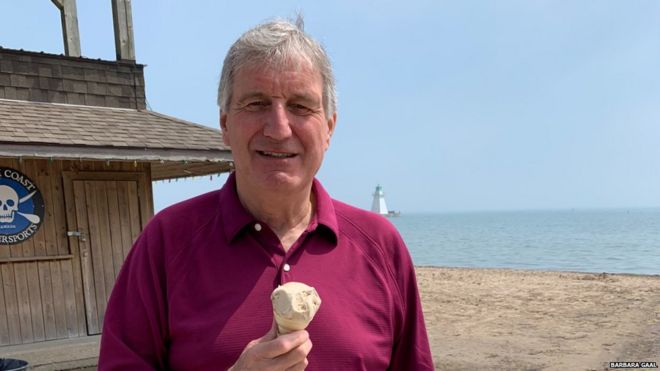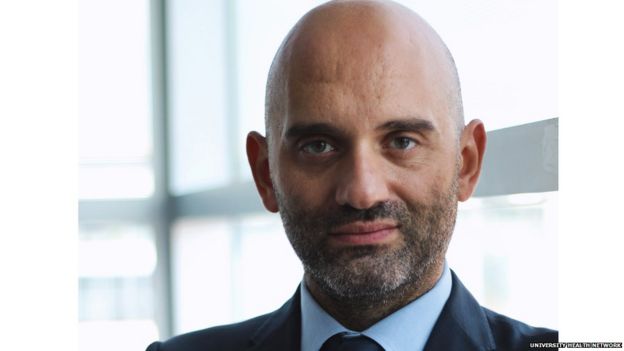'There was no hope': Treatable disease often mistaken for Alzheimer's
 BARBARA GAAL
BARBARA GAAL
When John Searle started to fall down and lose his memory, he thought it was the early signs of dementia. But it turns out he has a rare - and often undiagnosed - condition called normal pressure hydrocephalus. The good news is it's treatable.
A few years ago, John Searle thought his life as he knew it was over.
His body had slowly stopped working. He had trouble walking, he was falling down, he had bad short-term memory and, at 69, he was incontinent.
It was a pattern of decline the retired Canadian engineer from Brantford, Ontario was all too familiar with. His own sister had died of Alzheimer's in her 50s. His father had died of dementia in his early 80s. So he began to start planning for a future he would not be able to participate in.
"You kind of wonder where you're going. You start thinking, is this it?" he says.
Doctors could not give him a definitive diagnosis, which only infuriated the retired engineer more. Parkinson's treatment had no effect, he didn't have Alzheimer's but something was clearly not right. By 2018, he needed a wheelchair to go outside, and a walking frame inside his own home.
"There was no hope, I was sitting in the window watching life go by."
"He was angry - he was beyond angry," his wife Barbara chimes in. "There were nights when I was laying in bed thinking maybe I'll have to sell the house... because I had to do everything."
But that changed when he met Dr Alfonso Fasano, a neurologist at the Movement Disorders Clinic at Toronto Western Hospital, who diagnosed him with a condition called normal pressure hydrocephalus, or NPH.
The disorder is caused when excess cerebrospinal fluid accumulates in the brain's ventricles, which are the communication centre of the mind.
This build-up of fluid can cause movement difficulties, memory and cognition problems and incontinence - symptoms that are also often associated with more common degenerative illnesses, like Alzheimer's, Parkinson's or dementia.
- Dementia: Lifestyle changes that could lower your risk
- Dementia: The greatest health challenge of our time
Hydrocephalus Canada estimates that at least 1 in 200 Canadians over the age of 55, or more than 57,000 people, have NPH. In the US, the Hydrocephalus Association estimates that 700,000 Americans are afflicted, but that only about 20% of people living with the condition been correctly diagnosed.
"NPH is a condition that is not well understood yet," says Dr Fasano. Untreated, people may wind up in a nursing home, or die from complications. "That's what we don't want to see, people just dismissed," he says.
Mr Searle first heard about NPH when he saw a specialist to treat migraine headaches in 2003. An MRI revealed some fluid in his brain's ventricles, but because he had none of the telltale symptoms, he was not diagnosed.
In 2014, after several years of experiencing symptoms like memory loss and mobility difficulty, doctors did a lumbar puncture to drain some fluid from his brain to see if his symptoms improved, a common test for NPH.
Because Mr Searle's symptoms did not improve, his doctors determined NPH must not be the culprit.
Eight years later, with his health rapidly deteriorating, he met Dr Fasano and agreed to try the test again.
This time, his wife Barbara notice small improvements - so small that even her husband did not notice them.
"He wouldn't believe it," she said. "It was almost like 'if I believe it and they're wrong, it will be too big a disappointment.'"
 UNIVERSITY HEALTH NETWORK
UNIVERSITY HEALTH NETWORK
Dr Fasano suggested they insert a shunt into his brain to drain the fluid, the front-line treatment for NPH, with a high success rate according to recent studies.
More than a year later, and Mr Searle says he is beginning to get his life back. His gait has improved as well as his memory. He regularly works out with a personal trainer at the gym and goes on walks to help build his strength back up.
"The operation is only 50% of it, the rest is your mindset," he says.
Although he still does not have his drivers licence, Mr Searle and his wife have started to travel again. They went to Florida last winter, and they're planning trips to Las Vegas and Jamaica.
Barbara says the biggest change is her husband's mood:
"The apathy that plagued him is gone. He's his cheery self again."
Dr Fasano says since Mr Searle's story was shared with the media, the clinic has been overwhelmed with requests from patients who believe they have been misdiagnosed and have NPH.
Although misdiagnosis of NPH is a very real problem, Dr Fasano warns that most people who have been diagnosed with Parkinson's or Alzheimer's have the correct diagnosis - especially if they've been seen by a neurologist.
Up to 3% of the population over the age of 65 may have NPH, according to a recent study from Japan. The World Health Organisation estimates dementia, including Alzheimer's, affects between 5-8% of the population over 60.
"This is a disease that is probably more common than we think it is, and this is a disease that can be treated very well, with a huge dramatic change of quality of life for these people," says the doctor.
"At the same time, people are now believing that if they have Parkinson's, they were misdiagnosed.
"They all hope the doctor was wrong."

No comments:
Post a Comment